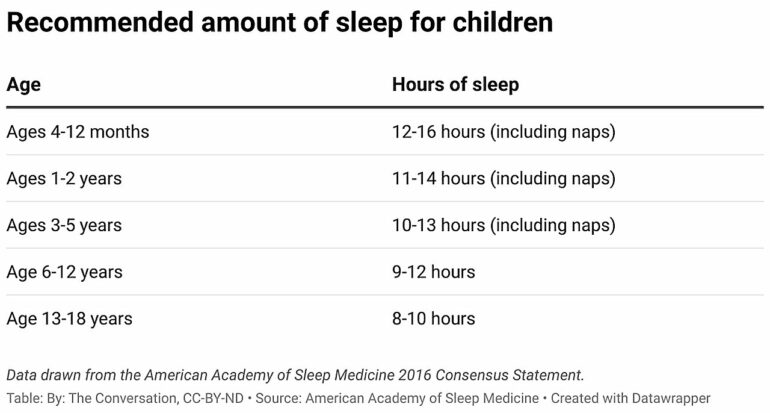Shorter sleep and later bedtimes are linked to potentially harmful functional changes to parts of the brain important for coping with stress and controlling negative emotions, our recently published research found. And children in families with low economic resources are particularly at risk.
We are neuroscientists who are passionate about reducing socioeconomic disparities in child development. To better understand how socioeconomic disadvantage affects sleep health and brain development in children, we recruited 94 5- to 9-year-old children from socioeconomically diverse families living in New York. About 30% of the participating families had incomes below the U.S. poverty threshold.
We asked parents to report on their child’s sleep environment, the consistency of their family routines, and their child’s bedtime and wake-up time. We also had children complete a magnetic resonance imaging scan of their brains to analyze the size of a brain region called the amygdala and the strength of its connections with other regions of the brain. The amygdala plays a critical role in processing emotions and the amount of negative emotion a person experiences. Adversity experienced early in life can affect how the amygdala works.

This animation of a brain MRI highlights in green a region deep in the brain called the amygdala.
Danielsabinasz via Wikimedia Commons, CC BY-SA
We found that children in families with low economic resources were getting less sleep at night and going to sleep later compared with children in families with higher economic resources. In turn, shorter sleep and going to sleep later were associated with reduced amygdala size and weaker connections between the amygdala and other emotion-processing brain regions. This link between socioeconomic disadvantage, sleep duration and timing, and amygdala size and connectivity was found in children as young as 5.
Our results suggest that both amount and timing of sleep matter for the functioning of these brain regions involved in emotion processing.
Why it matters
Not getting enough sleep increases the risk of developing mental health problems and interferes with academic achievement. Reduced sleep may make it harder for children to cope with stress and manage their emotions. Children from families or neighborhoods with low socioeconomic resources may be at increased risk for stress-related mental health problems due in part to the negative effects of their environment on sleep health.
During childhood, the brain develops at a fast pace. Because of this, childhood experiences can have effects on brain function that last a lifetime. Problems from childhood can continue throughout life.

Poor sleep can contribute to poor mental health and academic performance.
WC.GI/Moment via Getty Images
Our findings reinforce the importance of ensuring all families have sufficient economic resources to provide…



